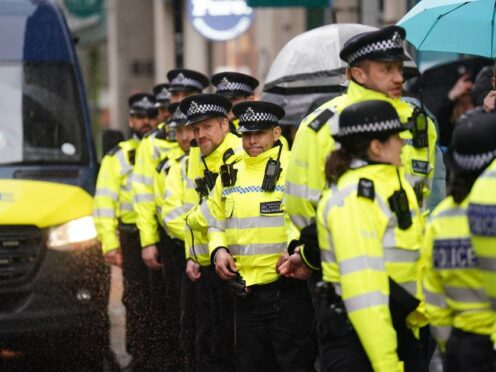New public order powers to prevent “disruptive” protests will come into force from Friday.
The Serious Disruption Prevention Orders will aim to prevent individuals from repeatedly causing serious disruption at protests.
Civil liberties organisation Liberty described the legislation as “a shameless attempt” by the Government to reduce the right to protest.
The new orders can impose a range of restraints including preventing people from being in a particular place or area, participating in disruptive activities and being with protest groups at given times.

They can also stop individuals from using the internet to encourage protest-related offences.
These orders can be imposed on those who have, on at least two occasions, committed protest-related offences, for example locking-on, or breached the conditions of an injunction.
Serious Disruption Prevention Orders were introduced as part of the Public Order Act 2023, which was passed last year, and breaching an order will be a criminal offence that will carry a maximum penalty of six months in prison and/or an unlimited fine.
Home Secretary James Cleverly said: “The public has a democratic right to protest and this government will always uphold that.
“However, recent months have shown certain individuals are just dedicated to wreaking havoc and causing severe disruption to the everyday lives of the public.
“This is why we have introduced these new powers to ensure that anyone who ignores warnings from our law enforcement cannot continue to cause turmoil unpunished.”
The introduction of the new orders is the latest step in the government’s crackdown on “disruptive protests”.
Jodie Beck, policy and campaigns officer at Liberty, said: “These measures are a shameless attempt to prevent people from being able to make their voices heard on the issues that matter most to them.
“In recent years, the Government has repeatedly introduced new laws which have reduced our right to protest.
“Many of these laws are so broad and vague, including locking-on offences, that when combined with these new measures, it could lead to people being banned from protesting entirely due to something as simple as having previously linked arms with other protesters.
“It’s especially concerning that there are even more crackdowns on protests planned in the Criminal Justice Bill, including proposed bans on face coverings which would impact clinically vulnerable protesters and political dissidents.
“Protest is a human right, not a gift from the state. The government should be supporting people’s right to protest, not chipping away at it.”

The Criminal Justice Bill will also prevent individuals from using the right to protest as a defence for committing criminal offences.
The Home Office has said this string of measures will ensure that people can exercise their democratic right to protest while ensuring the public can go about their daily lives safely and without serious disruption.
Under public order legislation, serious disruption may occur when protest activity prevents or hinders day-to-day activities, construction or maintenance works, causes delays to deliveries of time-sensitive products or disrupts access to essential goods and services in a way that is more than minor.
